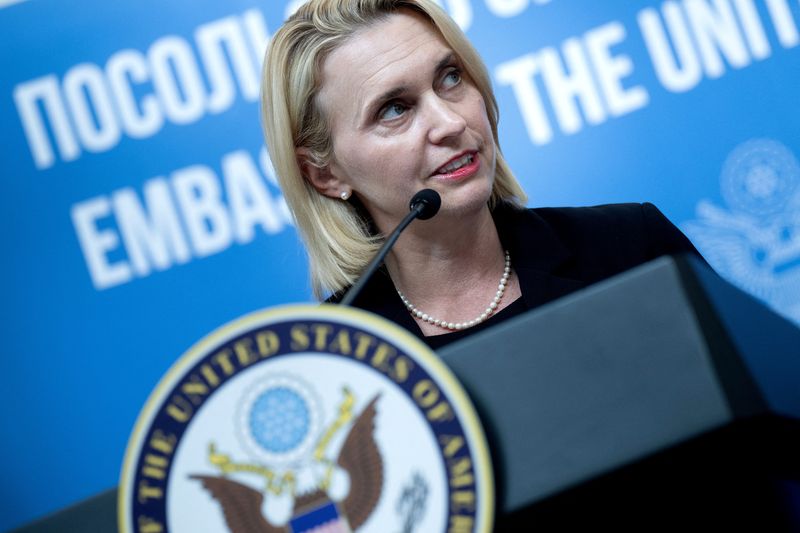The resignation of a U.S. ambassador is rarely a simple affair, often signaling deeper shifts in diplomatic strategy and policy. The recent resignation of former U.S. Ambassador to Ukraine, Bridget Brink, has brought such shifts into sharp focus. Brink’s departure, attributed to disagreements with President Trump’s foreign policy, underscores the tensions and conflicting approaches toward Ukraine and its relationship with Russia. This article delves into the circumstances surrounding Brink’s resignation, the implications of her statements, and the broader context of U.S. foreign policy under the Trump administration. We will explore the key reasons behind her decision, the reactions it has elicited, and the potential ramifications for future U.S.-Ukraine relations.
Bridget Brink’s Resignation: A Matter of Principle
Bridget Brink’s resignation as the U.S. Ambassador to Ukraine was not an impulsive decision, but rather a carefully considered response to what she perceived as a flawed foreign policy approach. According to her op-ed in the Detroit Free Press, Brink felt that the Trump administration’s policy disproportionately pressured Ukraine, the victim of Russian aggression, instead of focusing on holding Russia accountable. This fundamental disagreement on how to address the Ukrainian conflict led her to conclude that she could no longer effectively serve under the administration’s directives.
In her own words, Brink stated, “Unfortunately, the policy since the beginning of the Trump administration has been to put pressure on the victim, Ukraine, rather than on the aggressor, Russia.” This sentiment encapsulates the core of her discontent and highlights the ethical and professional conflict she faced. Her resignation underscores the importance of aligning personal principles with governmental policies, especially in matters of international diplomacy and human rights.
Trump’s Foreign Policy: A Shift in Focus
President Trump’s foreign policy has been characterized by a distinct shift from previous administrations, particularly in its approach to international alliances and conflict resolution. In the context of Ukraine, Trump’s administration signaled a desire to prioritize what it viewed as U.S. interests, sometimes at the expense of traditional alliances and established diplomatic norms. This approach involved a re-evaluation of the U.S.’s role in the Russia-Ukraine conflict, with an emphasis on burden-sharing and a more transactional approach to foreign aid and diplomatic support.
Critics of Trump’s policy argued that it weakened U.S. credibility and emboldened Russia, while supporters maintained that it was a necessary recalibration to better serve American interests. Brink’s resignation reflects the internal disagreements and ethical dilemmas that arose from these policy shifts, particularly among career diplomats who prioritize long-standing alliances and human rights concerns.
Implications for U.S.-Ukraine Relations
Brink’s departure raises questions about the future trajectory of U.S.-Ukraine relations. Her vocal criticism of Trump’s policies could potentially strain diplomatic ties, particularly if the new ambassador appointed by the administration aligns more closely with Trump’s foreign policy objectives. However, it also presents an opportunity for a renewed dialogue and a re-evaluation of the U.S.’s role in supporting Ukraine’s sovereignty and territorial integrity.
The U.S. has historically been a key ally of Ukraine, providing financial and military assistance to counter Russian aggression. Brink’s resignation serves as a reminder of the importance of maintaining a consistent and principled approach to foreign policy, one that prioritizes human rights and international law. Whether the Trump administration will heed this message remains to be seen.
Public and Political Reactions
The news of Bridget Brink’s resignation and her critical statements about President Trump’s foreign policy have elicited a range of reactions from the public and political spheres. Supporters of Ukraine have expressed concern over the potential weakening of U.S. support, while critics of Brink have questioned her loyalty to the administration’s policies. The resignation has also sparked broader debates about the role of diplomats in shaping foreign policy and the extent to which they should publicly disagree with governmental decisions.
Political analysts have noted that Brink’s departure could further polarize opinions on U.S. foreign policy, with Democrats likely to criticize Trump’s approach and Republicans potentially defending it. The incident underscores the deep divisions within American society regarding international relations and the country’s role in global affairs.
Bridget Brink’s Legacy
Regardless of the immediate political fallout, Bridget Brink’s resignation will likely be remembered as a moment of principled dissent in the face of conflicting ethical and professional obligations. Her decision to step down rather than compromise her values sets an example for other diplomats and public servants who may face similar dilemmas in the future. Brink’s legacy will be defined by her commitment to human rights, her support for Ukraine’s sovereignty, and her willingness to challenge policies she believed were detrimental to these causes.
The resignation of Bridget Brink as the U.S. Ambassador to Ukraine is a significant event with far-reaching implications. Her departure highlights the tensions and conflicting approaches within the U.S. government regarding foreign policy, particularly in relation to Ukraine and Russia. Brink’s decision to resign underscores the importance of aligning personal principles with governmental policies, especially in matters of international diplomacy and human rights.
As the U.S. navigates its role in the Russia-Ukraine conflict, it is crucial to maintain a consistent and principled approach that prioritizes human rights, international law, and the sovereignty of nations. Brink’s legacy serves as a reminder of the importance of ethical leadership and the courage to challenge policies that undermine these fundamental values. The future of U.S.-Ukraine relations will depend on the extent to which the Trump administration is willing to heed these lessons and adapt its foreign policy accordingly.

Leave a Reply